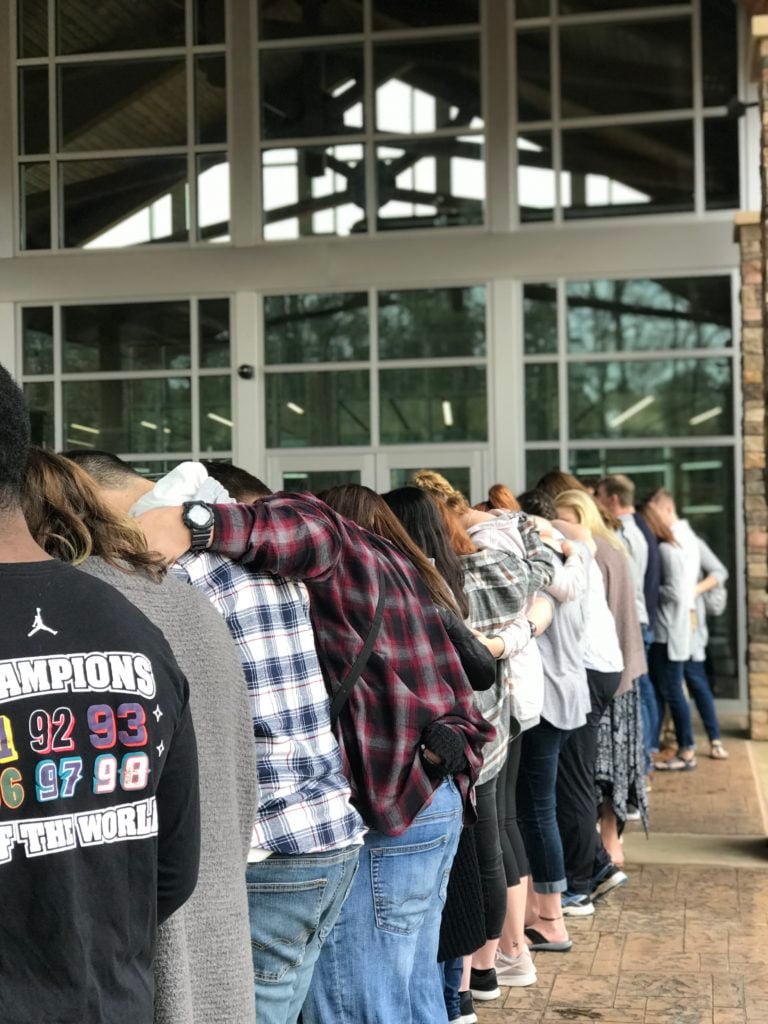In the face of change people react differently. Some feel the need to run or hide; others dig their heels in and fight. Unfortunately, both of these reactions avoid the problem or make the pain of change worse. Sometimes, though it is very rare, we see a third reaction — the courageous one. This means obeying God no matter the personal cost. On the night Jesus was betrayed, we see all of these reactions: the disciples fled from the men arresting Jesus, and Peter fought, cutting off the ear of one of the high priest’s servants with a sword. And then there was Jesus’ reaction: Jesus neither fought nor fled. Rather, he trusted God and obeyed, even taking the most perilous path in his obedience — one that lead to the cross. This was the most courageous act the world has ever seen.
63 of us Fellows are in the beginning week of learning alongside our brothers and sisters in Brazil. Now, obviously, going to Brazil is nothing like what Jesus endured. But, going to Brazil is something that will take courage. We will all be leaving the comfort of the familiar and entering into the mystery of the unfamiliar. In general, this is the stage of life we are in as a class: many of us are facing uncertainty about our future — whether it be about the next month, the next semester, or the next year. To some, this prospect is terrifying; to others, it is incredibly exciting. Either way, it will take courage to face because change is coming. Change always takes courage.

As a result of this, the idea of courage has been heavily on my mind. What is courage? Where does it come from? How does one get it?
We can see Jesus wrestling with His road in John 12:27-28. He says, “Now my soul is troubled, and what shall I say? ‘Father, save me from this hour’? No, it was for this very reason I came to this hour. Father, glorify your name!” (NIV) Jesus came “for this very reason” — in other words he lived that he might die — what a beautiful tragedy! It is here and in the garden that Jesus showed the purest example of what courage is — acting for the sake of what is good even in the face of opposition, even opposition from one’s own feelings.
When Jesus was in the garden praying just before he was to be arrested, it was obvious that he was feeling stressed. After all, it’s not every day that someone sweats blood. But to me, the most powerful aspect of Jesus’ time in prayer was not the sweating blood, but his words: “Father, if you are willing, take this cup from me; yet not what I will, but yours be done” (Luke 22:42, NIV). Jesus, the Son of the living God, was about to face something terrible. Jesus was about to be mocked, beaten, whipped, abandoned, and eventually crucified, dying a criminal’s death even though he was innocent. All of this he saw coming, and it led him to feel great sorrow and dread. But even though he was undeserving of the hardship, Jesus put down his own will, his own desires, his own plans for the sake of the Father.
So, what gave Jesus such tremendous courage to face such miserable suffering? Why would he do it? Where does courage come from in general? How can we learn to be courageous?
Jesus was not courageous for the sake of being courageous—he was courageous because he had a vision of what was good. His vision of goodness is seen everywhere the Bible talks about his suffering. “Father, glorify your name!” he said, and again in the garden, “… yet not what I will, but yours be done.” Both of these portray Jesus’ unhindered vision of what was good and his unwavering trust in God’s plans. This vision inspired Jesus to stand courageously and endure what was seemingly impossible for a man to endure. In Jesus’ actions, he displayed the depths of his trust in God, and his overwhelming, yet undeserved, love for His people. What a humbling thing.

But this has even deeper implications. Jesus’ courageous death shows us that the reward that he, along with those with him, will gain is much bigger than life. For who would die for what he already has? Nobody! Jesus died for something so much greater. This is incredibly exciting because when Jesus died, he took the punishment we deserved and also shared with us the reward he had gained — eternal life and reunion with the Father.
But his actions don’t just bring us hope after death, they also bring us hope in this life. Jesus’ courage shows us that we too can learn to be courageous in the midst of all our trials, unknowns, the good, and all our journeys. Being courageous starts with knowing Jesus and trusting in his promises — for he is good. With this vision of who God is we too can become people who are undeterred by any trial that comes our way. Any unexpected change or mysterious future is no match for the God who is sovereign over all creation — the God who has overcome even the worst enemy: death.
It is for this reason that even with a month for us in Brazil, and the uncertainty of the next season holds and life after this season looming, we Fellows pursue great hope. This does not mean that the future will not bring us trials of many kinds, but that in the face of these trials we aim to fix our eyes on Jesus and trust in God’s plans. So, instead of moving forward reluctantly, we choose to go with courage. With this trust and this hope we will be able to endure whatever trials come our way because we know that God is good and that he is working all things for the good of those who love him, who are called according to his good purpose — which is, to glorify himself, the greatest purpose in all creation. So whether we experience trials or successes, whether we are in painful seasons or joyful ones, we will aim fix our eyes on Him, for he is our hope and salvation.
Hebrews 12:1-3 says:
Therefore, since we are surrounded by such a great cloud of witnesses, let us throw off everything that hinders and the sin that so easily entangles. And let us run with perseverance the race marked out for us, fixing our eyes on Jesus, the pioneer and perfecter of faith. For the joy set before him he endured the cross, scorning its shame, and sat down at the right hand of the throne of God. Consider him who endured such opposition from sinners, so that you will not grow weary and lose heart. (NIV)
I pray that this will be so for us Fellows during our time in Brazil and as we look towards new season, and for our beloved family and friends, who we hope will keep us in their prayers as we embark.
With courage,
The Fellows
